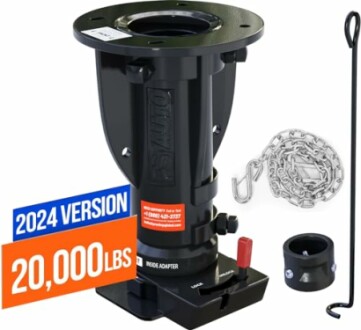
How to Choose the Right Trailer Hitch for Your Vehicle
Key Takeaways
- Determine the weight capacity you need based on your towing requirements.
- Understand the different types of trailer hitches available.
- Ensure compatibility with your vehicle make and model.
- Consider additional features like adjustability and ease of installation.
- Always refer to the vehicle’s owner manual for specific towing guidelines.
Selecting the right trailer hitch for your vehicle can greatly enhance your towing experience. Whether you're hauling a trailer for work or leisure, the right hitch ensures safety, stability, and convenience. In this guide, we will explore different types of trailers and what to consider when making your choice.
Types of Trailer Hitches
Understanding the various types of trailer hitches will help you choose the right one for your needs. Below is a brief overview of the most common hitch types:
| Hitch Type | Description | Best For |
|---|---|---|
| Class I | Lightweight hitch rated up to 2,000 lbs. | Small trailers, bike racks |
| Class II | Mid-range hitch rated up to 3,500 lbs. | Small to medium trailers |
| Class III | More robust hitch rated up to 8,000 lbs. | Medium to large trailers, campers |
| Class IV | Heavy-duty hitch rated up to 10,000 lbs. | Large trailers, heavy loads |
| Class V | Maximum capacity hitch rated over 10,000 lbs. | Industrial and commercial hauling |
Determining Weight Capacity
When selecting a trailer hitch, the first step is to determine the total weight of what you plan to tow. This weight should include:
- The weight of the trailer.
- The weight of any cargo inside the trailer.
- The weight of any additional accessories attached.
Most vehicle owner's manuals have specifications for the maximum towing capacity. It's crucial to stay within these limits to ensure safety on the road.
Compatibility with Your Vehicle
Your vehicle's make and model play a significant role in the kind of hitch you can use. Always check the manufacturer's specifications for compatible hitches. Some vehicles might require specific mounting kits or offer integrated hitch systems designed for their trucks.
Features to Consider
When looking for a trailer hitch, consider the following features:
- Adjustability: Some hitches allow height adjustment, making them versatile for different trailer types.
- Ease of Installation: Look for hitches that come with a straightforward installation process and necessary hardware.
- Durability: Powder-coated finishes can help resist rust and corrosion, ensuring longevity.
Featured Product
Fifth Wheel to Gooseneck Cushioned Trailer Hitch Adapter
This cushioned gooseneck adapter converts your 5th wheel into a gooseneck within minutes, enhancing towing capability.
Learn MoreInstallation Tips
Installing a trailer hitch can be a straightforward process if you follow these tips:
Beginner Section Tips
- Ensure all tools are ready before starting the installation.
- Read the instructions thoroughly, as different hitches have varying requirements.
- Consider having a friend assist you with heavy components.
- Always use safety gear and check all connections before towing.
Safety Practices
Following safety practices is essential for any towing activity. Here are some key points:
- Check your hitch and trailer connections regularly.
- Ensure that the load is balanced properly across the trailer.
- Utilize safety chains as a backup connection in case of hitch failure.
Conclusion
Choosing the right trailer hitch is a critical decision that impacts your towing capabilities and safety. By understanding the types of hitches, assessing your towing needs, and considering key features, you can make an informed choice that fits your vehicle and lifestyle. For more information on various trailer hitches, visit our Trailer Hitches Resource Page.
Pros
- Wide range of options for different towing needs.
- Features available for enhanced performance.
- Improved safety when using the correct hitch.
Cons
- Can be complicated to install for some types.
- May require additional accessories based on vehicle.

